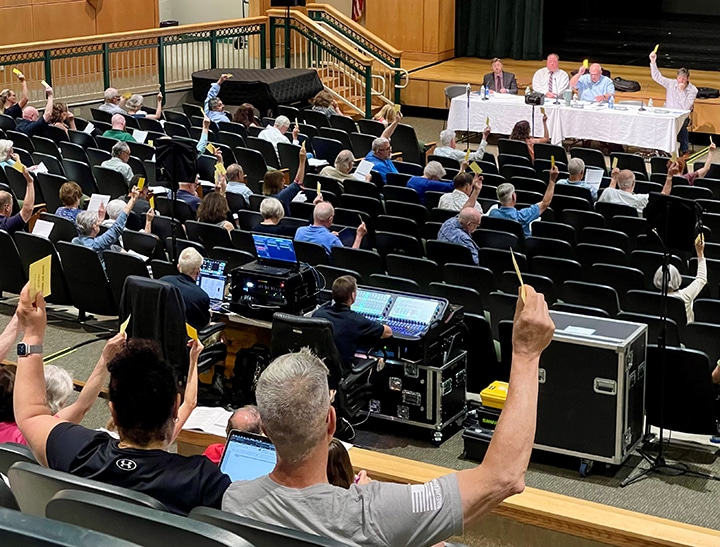Community members cast their votes during the June 3 annual Town Meeting in Wilbraham.
Reminder Publishing photo by Bill Zito
WILBRAHAM — A two-hour Town Meeting moved swiftly through a warrant containing 57 articles with attention focusing on the seemingly resolved differences in the budget numbers for the Hampden-Wilbraham Regional School District budget, funding for a new fire engine, issues concerning drinking water, battery storage, additions to the Memorial School pickleball courts, the presence of ice cream vendors and steeper fines for littering in town.
Moderator Jane Clark presented Articles 1-15, covering annual and non-compensated elected offices, transfers of funding, solid and wastewater expenses and the continuation of revolving funds met approval through the first of two consent agenda items while two of the listed articles moved with no action taken and no vote.
Finance Committee Chair Kevin Hanks provided a look at the budget review and conclusions drawn to the voting community members in attendance.
The overall budget for fiscal year 2025, presented through the Finance Committee report, was approved for $52.5 million as covering necessary capital expenditures and operating expenses. A recommended increase to the HWRSD assessment, made at a May 21 School Committee meeting and later approved at a May 29 vote was approved as part of the Town Meeting.
Among the capital projects identified for appropriation from free cash were $110,000 for the roof at Memorial School, $248,000 for Highway Department vehicle purchases, $68,850 for IT systems and $46,000 for the Police Department to cover the purchase of tasers for officers. $181,721 was also approved for wireless access points at Minnechaug Regional High School and $135,000 for upgrades and additional to the town’s CCTV system.
The previously identified assessment of $28.75 million was increased to $28.79 million and resolved via a warrant article identifying changes in allocations from the Capital Stabilization Fund, appropriations and free cash.
HWRSD Superintendent John Provost and Assistant Superintendent Aaron Osborne provided a brief breakdown of the district budget, noting that the Wilbraham assessment accounts for 56% of HWRSD’s budget.
“We literally could not achieve our educational mission without your ongoing support,” Provost told audience, thanking them for their support and the vote to approve the budget.
An article for the town to appropriate or borrow $984,000 to purchase a fire engine passed easily as did the appropriation of $250,000 for the Wilbraham Drinking Water Asset Management Plan Project, part of the state’s revolving fund to enable the town to develop a comprehensive water infrastructure Asset Management Plan. 60% of the total project cost will be reimbursed by MassDEP and the Massachusetts Clean Water Trust.
The first issue of major discussion concerned the proposed transfer of $165,000 from FY25’s Community Preservation Undesignated Funds to provide lighting and seating for the pickleball courts at Memorial School.
The Finance Committee, while recommending other articles by majority or unanimous vote, did not endorse the motion, voting 8-0 against funding the project.
In answer to why the committee voted against it, Hanks said the decision was less about the pickleball project itself and more about the fate of the Memorial School building.
“It’s our desire to see the overall plan of that building and the long-term costs and the full project costs before investing further into the property,” he said.
Southwood Drive resident John Hegerty spoke in favor of the motion, noting that funding for the courts themselves was approved last year.
“We’re building the pickleball courts and as a pickleball player and I don’t speak for all the pickleball players but there’s a lot of us, we play at the Y, we play at Memorial School indoors, I think that we should have lighting and seating, I don’t see that as an exorbitant expense and since we’re already spending over $300,000 to put the courts in, I think that the players should have seating and lighting.”
Other community members spoke in favor of seating but not lighting citing concerns about electricity costs and raised questions about what would be happening with the school building. By audience member request, Community Preservation Chair Tracey Plantier explained Article 97, an amendment to the state Constitution and how it could potentially apply to the proposal.
“What Article 97 does is protect property,” she said. “It protects recreation property and it protects conservation property. So, we are obligated when we have a recreation project to put it on land that’s protected as recreation property so that the money is being spent on something in perpetuity.”
Plantier went on to explain that a property protected under Article 97 would require a Town Meeting vote by residents to effect any changes to that property and a vote by the state legislature would also be necessary before the town would be to replace the property in question.
Town Administrator Nick Breault and town counsel Brian Winner also addressed the question of whether Article 97 would apply in the particular case of adding the lighting and seating to the court project. Both Breault and Winner pointed to prior CPA appropriations which may have put the amendment into play and may impact future actions on the property but not the appropriations currently presented as part of the Town Meeting article and warrant.
Following the extensive discussion, the motion ultimately failed, the only article of the evening did not pass by majority vote.
The second consent agenda encompassed Articles 43-56 and proposed amendments or additions to general bylaws and included fees and fine structures.
Main Street resident Charles Clark spoke in opposition to and asked for clarification on Article 46 which proposed or updated language in regard to the permitting of ice cream truck vendors in town.
Clark said he was against the vendors driving up and down streets in town.
“Not to interfere with anybody’s right to earn a living or children to enjoy ice cream,” he said. “I don’t think we need the congestion in our town and cruel as it may be, we should buy our children ice cream.”
Police Chief Ed Lennon said the town does not have a choice and is in fact, required to give permits out to the vendors. He did acknowledge that state rules do exist, but the town is able to pass a bylaw to effect further constraints on how permitting and violations are processed.
Responding to fine structures contained in Article 48, Linda Lankowski, who resides on Tinkham Glen asked whether fines for violations such as littering could be increased.
“Instead of it being $50, could we make it $500?” she asked. “Maybe it would stop it from happening if somebody got fined a decent amount.”
Lennon explained the difference between littering, which currently calls for a $50 civil fine as opposed to dumping violation, a state criminal violation. A proposal for a $300 civil fine for litter amounts over three cubic feet and part of the article was passed as part of the Consent Agenda.
The 57th and final article of the warrant, the Home Rule Petition, allowing for appointment and removal authority by the town administrator for specific positions other than sworn police and fire and department heads appointed by the Select Board, passed by majority before the meeting was dissolved.



